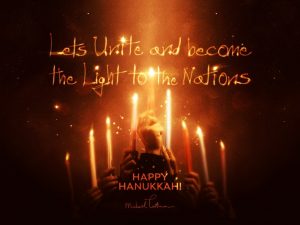
Chanukah (also spelled “Hanukkah,” Heb. “חנוכה”) signifies the beginning of our feeling the unified force of nature. It marks the initial penetration through the boundary between this world and the spiritual world.
The Hanukkah concepts and customs link to the crossing of this boundary between egoistic and altruistic perception, which requires rising above our inborn desires that prioritize self-benefit over benefiting others.
The Maccabees-Greeks war unfolds internally, within us, between our ego’s reasoning (the Greeks) and the tendency to unite by drawing the force of nature into our connections (the Maccabees).
But how can we possibly cross the boundary of our very human nature, which defines us as the egoistic beings we are?
In addition, our desires to unite, to love and to care about others is tiny compared to the ego, which constantly pressures us to enjoy at the expense of others.
It is on this dilemma that the miracle of Hanukkah comes into play.
Our persistence to unite above our desires for personal benefit attracts nature’s force of love, bestowal and connection, which is also called “light” in the wisdom of Kabbalah.
Even though we have comparatively very small desires to unite, to love and to care about others compared to our self-aimed desires, i.e., materialistic pursuits for money, honor, respect, power, control, fame and knowledge, by creating a social atmosphere that supports and encourages us all to rise above our self-aimed desires, then we direct ourselves to unite above our egos.
Eventually, by participating in such a society that values uniting, loving and caring each other above our innate desires to enjoy personally at others’ expense, we then end up feeling incapable of rising above our ego, since it our very human nature. In the Hanukkah story, this is considered as the Maccabees feeling incapable of defeating the Greeks.
At that crucial juncture, a miraculous light appears—the unifying force of love, bestowal and connection that dwells in nature, which gives us the energy we need in order to overcome our egoistic desires with a unifying, loving and giving tendency. That is the meaning of the Maccabees winning the war against the Greeks.
We prosper when we, on one hand, feel a necessity to win the war, but on the other hand, find ourselves out of options and in despair, i.e., under the attack of the Greeks. While under attack, we feel like we need to keep fighting with all everything we have, however with no success in sight. In any case, due to sensing a responsibility to win the war, we do not throw in the towel, because it would be like agreeing to be locked away in the ego’s solitary confinement.
At that point, the miracle happens—the illumination of the light of unity, love and bestowal. It charges us with its omnipresent energy, and we win the war.
The Hanukkah war is internal, taking place on the boundary between egoistic desires versus those of unity, love and bestowal. Our egoistic desires and thoughts are what filters our perception of the boundless force of love and bestowal surrounding and permeating us, and we revel in the revelation of this force when we win the battle for unification above our egoistic desires.
Featured in Quora